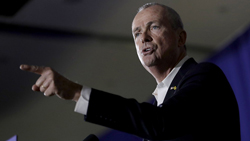As New Jersey prepares to inaugurate its new Governor-elect, Phil Murphy, many are approaching his election with uncertainty due to his stance on the legalization of marijuana.
Murphy has said that he would sign a bill to legalize marijuana within his first 100 days in office and it would be beneficial to the state.
“Phil Murphy definitely represents a turn away from [Governor] Christie’s policies,” Stephen Chapman, Ph.D., an assistant professor of the political science, said. “This is not surprising for a couple reasons. First, NJ is a Democrat-leaning state that hasn’t voted for a Republican in a presidential election since 1988. This gives Murphy an advantage from the start. However, there is a diversity of ideology throughout the state level, which is why we’ve seen more alternation between [Democrats] and [Republicans] at the state executive position,” he added.
In his 2017 gubernatorial campaign, Murphy ran on a platform of changes that he hoped to bring to New Jersey, such as getting tough on gun violence and protecting women’s rights and the rights of undocumented immigrants, such as the DREAMers, as well as the rights of the LGBT community. “I’m glad that Murphy will be a governor who ensures the rights of women, immigrants, and the LGBT community,” Roxy Nicoletti, a sophomore biochemistry student said.
On his campaign, Murphy had noted that after the Recession in 2000, New Jersey was one of the slowest recovering economies and, therefore, believes that having more secure jobs with rising wages would help to revitalize the state’s economy again. In addition, Murphy believes that legalizing and taxing the sale of marijuana would help to bring more revenue into the state government—which many feel apprehensive about.
Alexis Borrino, a sophomore education student, worries that by legalizing marijuana, the state is sending a “dangerous” message. “I’m definitely for decriminalizing marijuana; too many people are being imprisoned for just possessing marijuana, even if they do not use it themselves,” Borrino said. “However, I think legalizing recreational marijuana is sending a dangerous message to New Jersey, especially to young people whom the policy appeals to. New Jersey is facing a huge opioid epidemic and I believe saying that marijuana is okay might give leeway for young people to try other, more lethal drugs,” she continued.
Upon winning the Democratic primary nomination, Murphy justified his decision: “The criminalization of marijuana has only served to clog our courts and cloud people’s futures, so we will legalize marijuana,” he said. “And while there are financial benefits, this is overwhelmingly about doing what is right and just.”
According to NJ.com, towns that will opt out of the selling or growing of marijuana will miss out on an estimated $300 million annual tax revenue that marijuana will generate.
Polina Amburg, a specialist professor in the Department of Nursing, explained, “There is some evidence indicating positive responses in patients taking medicinal marijuana. Marijuana is being prescribed for various reasons, but most common uses of the medicinal marijuana are for pain control.”
Amburg also warns about some of the potential dangers of the drug. “I witnessed a young mother collapse in public due to her mixing marijuana and beer,” she said. “I took care of a patient who developed severe psychosis and hallucinations as a result of taking marijuana. Another patient became very confused and disoriented after using marijuana.” However, Amburg explains that while these may occur, they are not common.
Michael Milford, a forensic psychology student and a United States Air Force Special Operations Command veteran, explains that he has benefited first hand from the use of medicinal marijuana. “Medicinal Marijuana stabilized my life in all aspects. It’s an all-in-one remedy for pain, anxiety, and PTSD,” Milford said. “It’s a natural alternative medicine, greatly appreciated over getting hooked on big pharmaceutical medications.”
Researchers at the Arizona State University have also reported there is no negative effect on any measures of health, other than on the user’s dental health. According to the researchers, marijuana users had “a higher incident of gum disease.” However, this is only for chronic users. “Chronic marijuana use is about as bad for your health as not flossing,” the Washington Post reports.
Additionally, a CNN report has recently come with the new potential use of marijuana for treating drug addiction. According to the report, treatment centers are using marijuana as a detox and a helpful protocol for those with extreme addictions. “With cannabis, there is no known lethal dose; it can be helpful for certain conditions,” Joe Schrank, the Director of the Treatment Center at High Sobriety stated in the report.
Ultimately, their goal is not only to get drug addicts off their opioids, but also to reduce drug use in general.
In a drug fact sheet, the Drug Enforcement Administration has reported that there has been “no death from overdose of marijuana.” Moreover, there is a significant difference between the deaths caused by prescription drugs, illicit drugs, such as cocaine and heroin, and opioids. In 2015, the National Center on Health Statistics reported 29,728 people died from prescription drugs and 21,823 died from illicit drugs. Opioids caused an astonishing 33,091 deaths in 2015, while marijuana caused zero.
Furthermore, in all of the years it has been used, no known deaths have been caused by marijuana. It is a drug that has not killed anyone, and yet comes with many benefits such as: treatment of multiple sclerosis muscle spasticity, cancer-relates pain, appetite stimulants in AIDS patients and for chemotherapy-related nausea and vomiting, as Wynne Armand, M.D., a Physician at the Massachusetts General Hospital and an assistant professor in Medicine at the Harvard Medical School reported.
In response to Murphy’s ambitions to legalize marijuana for its financial and medical advantages, current-governor, Chris Christie told New Jersey 101.5, “It’s blood money; it’s disgraceful and it’s disgusting.”
IMAGE TAKEN from NY Times

